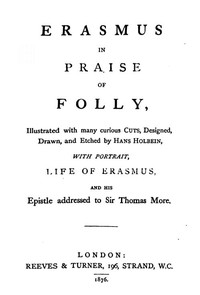In Praise of Folly by Desiderius Erasmus
"In Praise of Folly" by Desiderius Erasmus is an oration written in Latin in 1509. In this spiraling satirical work, the personified goddess Folly praises herself while attacking every aspect of human life—from lovers and princes to superstitious religious practices and church corruption. What begins as playful mockery grows darker as Erasmus examines self-deception, madness, and the contrast between human wisdom and divine folly. The work ultimately pivots toward an orthodox Christian
purpose, revealing deeper meaning beneath its satirical surface. (This is an automatically generated summary.)
Read or download for free
| Reading Options | Url | Size | |||
|---|---|---|---|---|---|
| Read now! | https://www.gutenberg.org/ebooks/30201.html.images | 325 kB | |||
| EPUB3 (E-readers incl. Send-to-Kindle) | https://www.gutenberg.org/ebooks/30201.epub3.images | 11.0 MB | |||
| EPUB (older E-readers) | https://www.gutenberg.org/ebooks/30201.epub.images | 11.0 MB | |||
| EPUB (no images, older E-readers) | https://www.gutenberg.org/ebooks/30201.epub.noimages | 160 kB | |||
| Kindle | https://www.gutenberg.org/ebooks/30201.kf8.images | 11.0 MB | |||
| older Kindles | https://www.gutenberg.org/ebooks/30201.kindle.images | 11.0 MB | |||
| Plain Text UTF-8 | https://www.gutenberg.org/ebooks/30201.txt.utf-8 | 274 kB | |||
| Download HTML (zip) | https://www.gutenberg.org/cache/epub/30201/pg30201-h.zip | 10.6 MB | |||
| There may be more files related to this item. | |||||
Similar Books
About this eBook
| Author | Erasmus, Desiderius, 1469-1536 |
|---|---|
| Illustrator | Holbein, Hans, 1497-1543 |
| LoC No. | 32015550 |
| Uniform Title | Moriae encomium. English |
| Title |
In Praise of Folly Illustrated with Many Curious Cuts |
| Note | Wikipedia page about this book: en.wikipedia.org/wiki/In_Praise_of_Folly |
| Credits | Produced by David Widger |
| Reading Level | Reading ease score: 38.1 (College-level). Difficult to read. |
| Language | English |
| LoC Class | PA: Language and Literatures: Classical Languages and Literature |
| Subject | Folly -- Early works to 1800 |
| Category | Text |
| EBook-No. | 30201 |
| Release Date | Oct 6, 2009 |
| Most Recently Updated | Oct 24, 2024 |
| Copyright Status | Public domain in the USA. |
| Downloads | 3640 downloads in the last 30 days. |
| Project Gutenberg eBooks are always free! | |

